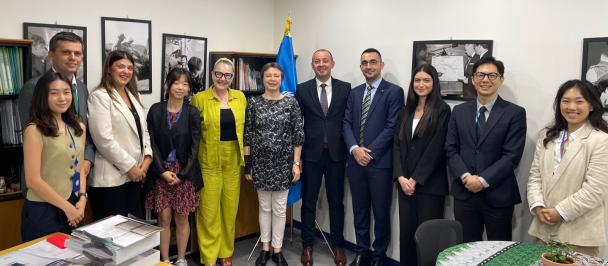Fostering collaboration for sustainable forestry development: Mission to Siem Reap, Cambodia
May 19, 2024

On 15 May, UNDP Seoul Policy Centre and Korean forestry experts, including representatives from the National Institute of Forest Science (NIFoS), Korea University and Daegu University, began a five-day mission in Siem Reap, Cambodia with the aim to share Korea's expertise in community-based forestry and foster collaboration with Cambodian counterparts.
With a warm welcome from UNDP Cambodia, the team engaged with key stakeholders to explore conservation, capacity building, and livelihood development opportunities within community forests (CFs). Visits to significant CF sites like Changkran Roy and Teuk Chob Khnar Por led to an engaging knowledge exchange on forest economic development, non-timber forest product processing, and community-based ecotourism, while also aiming to enhance existing policies to improve income opportunities.
On the second day of the mission, the delegation concluded a productive workshop in the Changkran Roy CF in Siem Reap province, Cambodia. Spanning 9,104 hectares, this woman-led community forest is a vital resource for 1,852 CF member families, providing non-timber forest products and potential ecotourism opportunities. During the visit, the Korean delegation engaged in meaningful discussions with local authorities and community members to explore opportunities for conservation, capacity building and livelihood development.
Following the workshop in Changkran Roy CF, the Korean delegation made their way to Teuk Chob Knar Por CF on 17 May. Spanning 1,022 hectares, this lush semi-dense forest supports 1,201 families with its rich biodiversity, including majestic Mangroves and wild animals. The forest offers a bounty of non-timber products like wild mushrooms and traditional medicines, providing vital sustenance and livelihoods to the community. Despite these ecosystem services, the forest faces threats from illegal logging, encroachment, and climate change-induced wildfires, necessitating urgent action to protect this precious ecosystem.
The team focused on identifying challenges and developing sustainable solutions to enhance forest preservation and community livelihoods. Although both CFs are located in Siem Reap province in Cambodia, the Korean experts identified different challenges in each of the communities. Regarding Changkran Roy CF, experts recommended investing more in conservation and infrastructure for tourists to develop ecotourism around a rare Coral-billed Ground-Cuckoo in the region. However, for Teuk Chob Khnar Por CF with already a more established ecotourism, the experts recommended improving management to increase conservation efforts and better utilize resources. Based on these observations, the Korean delegation will provide a detailed policy recommendation for the CFs which will be passed on to them through UNDP Cambodia.
The key topics that guided the activities during the five-day mission encompassed integrating forest economic development, processing non-timber forest products and developing community-based ecotourism. The mission underscores the importance of international cooperation in achieving sustainable development goals, and supporting the Changkran Roy and Teuk Chob Khnar Por CFs in their conservation and sustainable development efforts.

 Locations
Locations












